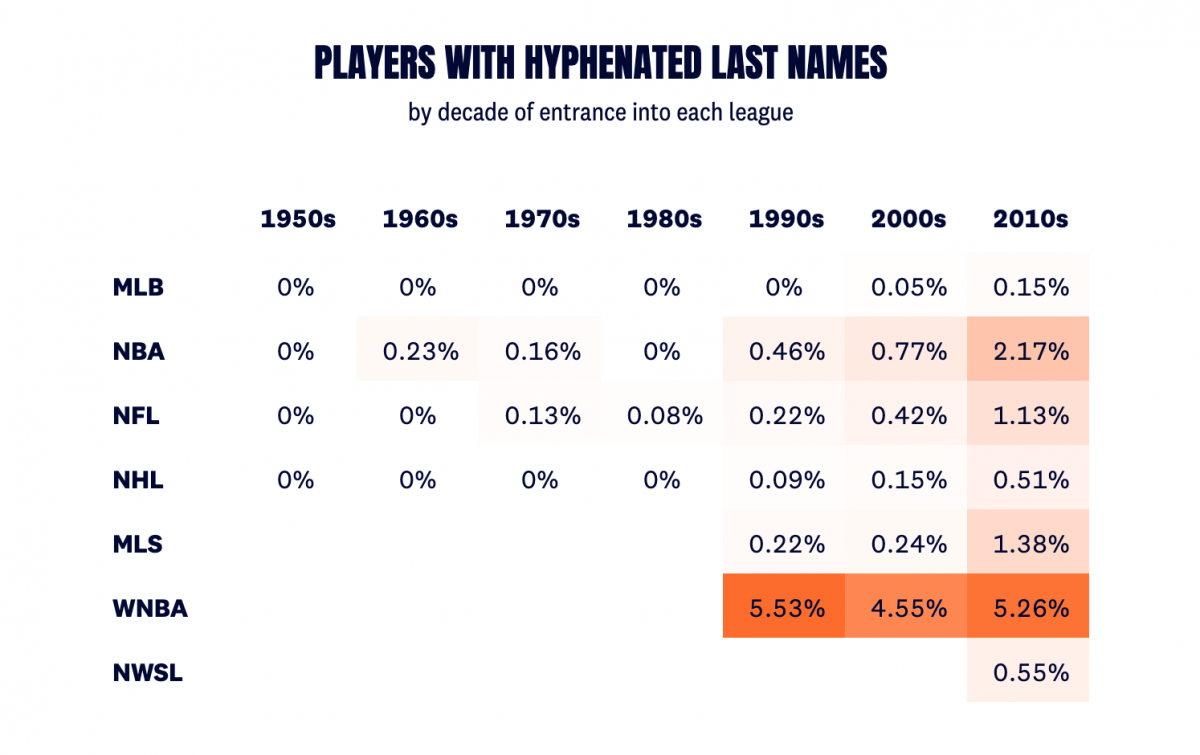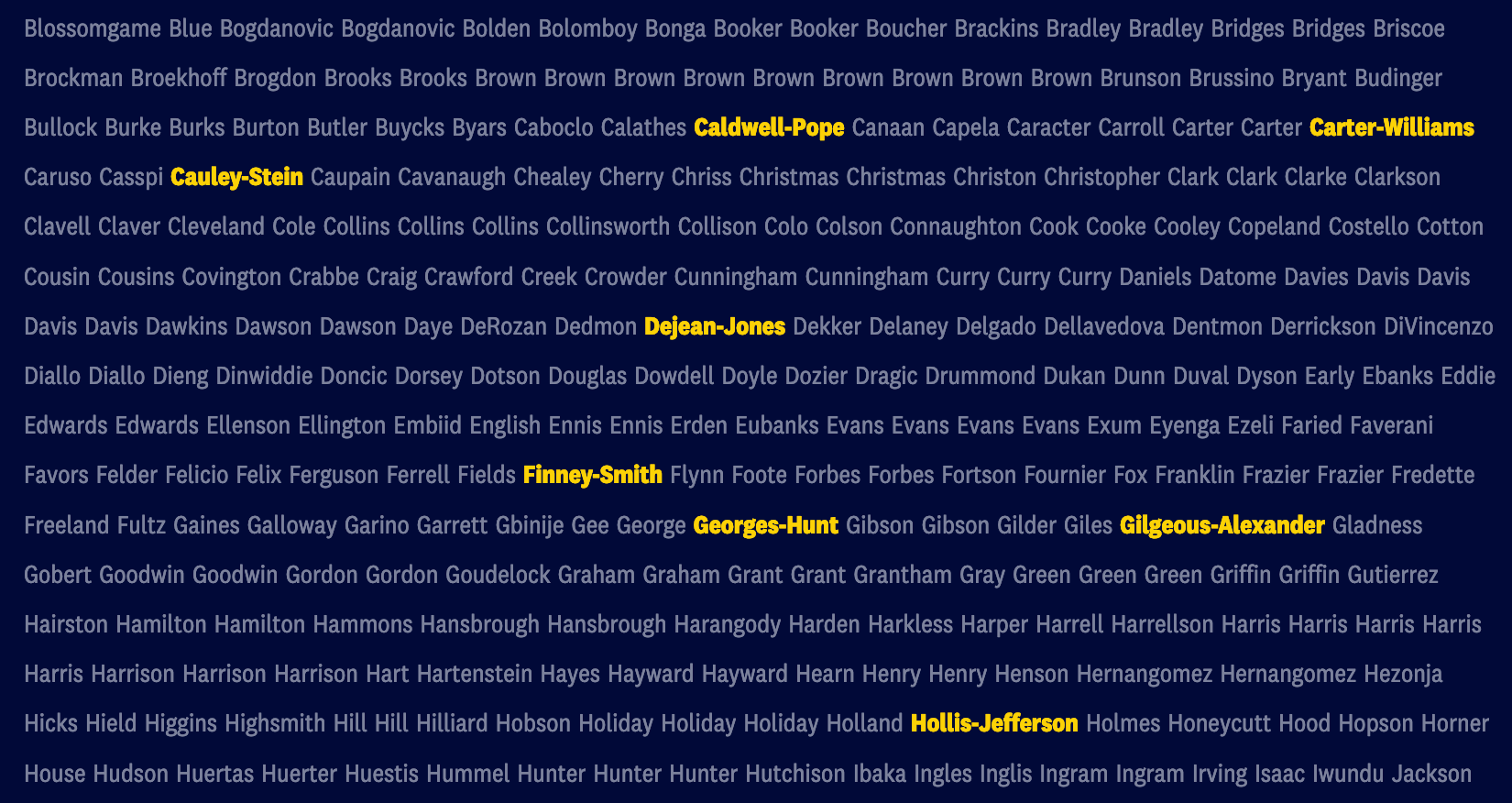How The Pudding visualized the prevalence of hyphenated names in sports
At first glance, a hyphenated name is bound to catch your attention — take NFL player Ha Ha Clinton-Dix’s name, for instance. For Clinton-Dix, who plays for the Chicago Bears, his last name is everything. He explained in a 2014 interview that his grandfather was his biggest inspiration growing up, constantly reminding his grandson that “the one thing you have to represent is your last name.” So Clinton-Dix made sure he did just that, attaching both his maternal and paternal surnames to his first.
But how common are hyphenated names in sports? Jan Diehm, a journalist-engineer at The Pudding, wanted to find the answer. Diehm spoke with Storybench about the inspiration behind her data visualization essay and the work that went on behind the scenes.
What inspired you to do a project on this topic?
I’m a big sports buff. I watch a lot of sports and I’m also a big fan of design, so I kind of notice how jerseys are designed, new logos and stuff like that. And I saw a couple of names that were just kind of arching over the back and the numbers and I was like: well those are really long they’re going to the shoulder blades, even on huge football linemen. It definitely caught my eye visually. But my wife and I are also at that point in our lives when we’re starting to talk about eventually having kids and what we would do. We both kept our same last names, so when we would talk about if we’d hyphenate, I don’t know. We have really odd names that don’t necessarily go together, but a lot of the names I found didn’t go together. I don’t know if you’re familiar with Freakonomics, but it’s like that sweet spot where it’s a little bit like social science but with a pop culture or sports angle. So it checked a lot of boxes for me and I knew I could get the data.
How do things work at The Pudding and how did you pitch this piece to your editors?
We’re a team of six journalist-engineers and we base our structure loosely on this idea of a holacratic system where we all kind of have equal weight. So there’s not necessarily an editor or somebody over me, there’s just a more collaborative team environment. So we have a process called Story Time, which happens once every week, and we just throw out ideas and often questions. This one was like, “Have hyphenated names really expanded in sports over the recent years?” and then see if anybody else was interested in that question, how would you go about tackling those. We get feedback and then if we personally think it’s a good idea to continue exploring it then we’ll be like, “Okay, I’m going to block out some time for this,” and do a little bit more exploration and then come back to the team with initial findings like, “Is this interesting and does it check out?”
I think the initial digging I did was just on the NBA, so I didn’t scrape all of the sports leagues, I just focused on one and then came back to the team and was like, “Ok, this is what I found in the NBA; I think it’s interesting, do you think it’s interesting? Should we keep going?” Once everybody is on board with that idea then that’s when all the other data work comes and then you do the overall storyboard and go back to the team and be like, “Hey does this look like something that you’d be interested in playing around with and learning about?” And that’s when we start to see a lot of design, and the sketches come out and we see different iterations on what the final product starts to look like.

Can you walk us through your research process?
For most of the leagues there are roster sites, like prosportsreference.com or basketballreference.com, footballreference.com and you can go and look. They have lists of players that have played for each year, usually alphabetically. For each sport there was like a three step process of scraping and getting the HTML then getting the links to the player’s names, then getting the actual player’s names themselves and then combining them and then checking for a hyphen. So basically, I just ran a check to see like, “Did a hyphen occur in the name at all?” And then I ran a second check for if the hyphen occurred after a space in the name, which would get me the last name. And then there were a couple of instances where I just had to go back through and do some kind of manual data checking, to make sure that everything looked good, and then I narrowed it down.
I think there were just over two hundred hyphenated names, so it was enough to be able to go through and manually check those. I Googled, like, every one of them. And a lot of this information didn’t make it into the final piece because I couldn’t find maybe 20 or 30, but I looked at marriage records, I looked at sports articles, any kind of article like, “Oh, so-and-so changed their name” or “So-and-so got married” or this, that or the other to find their name origin story.
It excluded a lot of Korean based names, where the last name and the first name are actually reversed from western culture. So that took out a lot of those hyphenations that would initially meet the data criteria because they were after the space and have a hyphen, but culturally didn’t meet the definition of a hyphenated last name.
A lot of it was just me Googling. I remember Maurice Jones-Drew; he was a football player and he used to play under the name Drew and during his college career he changed it to honor his mother. There were a lot of those types of stories and when you Googled it, it just came up immediately. So it wasn’t a hard task but some of the kind of more obscure ones, I would say especially in the WNBA and the Women’s Soccer League, aren’t written about quite as often. They were harder to come by, unless they had gotten married because then you could find it kind of weird records.
Were you surprised by any of the data you found surrounding female athletes and the lack of hyphenated names?
I think I found what I thought would be there. Culturally, if somebody hyphenates a name it’s often because of a marriage and a lot of these women are at the peak of their game, so they have already made a name for themselves with their maiden name. I’m thinking Skyler Diggins-Smith, people knew her as Skyler Diggens before she got married. And in order to keep her identity tied to this already celebrity-like status that people knew her name as, it made more sense to hyphenate.
When I was talking to researchers they say you see it a lot on Facebook with your friends getting married. They’ll keep their maiden name on their Facebook because it’s way easier to find people depending on when you knew them, pre- or post-marriage. I think it was what I expected to see, which was more longitudinal data because the links are so new. It was really hard to make any determination if they were increasing or not, because we don’t know yet.
You explicitly said that during your reporting, you realized that hyphenated names are actually quite hard to study. Can you talk about some of the roadblocks you encountered in your reporting, and how your worked around them?
I didn’t encounter any for sports but in the initial project, it was a little bit more like. How do sports hyphenations compare to the general public. And it kind of had to morph into this very narrow sports hyphenated names because that general public information just was not there.
I found a couple of researchers who had done stuff with marriage announcements using New York Times data and just like combining names after that, but largely there’s not a big source of hyphenated names data anywhere in the U.S. for anonymity reasons.
Can you talk about what went into the visual elements of the project?
I was pretty dead set on doing something with the names themselves as the data because like that was the initial thing that attracted me to the subject anyways, like seeing those names and seeing the hyphens in there. So I did a lot of sketches of bar charts with their histogram with the names stacked up or anything like that, but it just did not really convey what I was trying to convey. But I was still kind of on the hunt for a way to make the names the data, instead of doing any kind of like traditional viz like a bar chart or anything.
So that’s kind of how the idea of the animated wall of words happened, [I] was just like “I know these words need to be the centerpiece, but how do I do it in a way that makes sense, you can see it over time and the names are still prominent?”
When you came up with the idea for this project, what were you hoping that users would be able to take away from it?
I think that I was hoping that people would kind of read between the lines a little bit and [see] that despite it being about sports, it wasn’t really a sports project. It was more about blended families, cultural differences, the idea that your last name— especially for athletes is so visible. A lot of the names that I was kind of seeing in recent years were changed to honor a mother or a grandfather or something [that’s] not necessarily a stereotypical marriage combination. So the idea that the last name could be kind of a political activism in that sense, you see that with Kareem Abdul-Jabbar and a lot of Muslim hyphenated last names. Hopefully, through the sports lens, there was a broader understanding of identity.
Do you think that we can expect to see more hyphenated names in the future, specifically with female professional athletes?
I honestly have no idea. I think with the The New York Times hyphen data research, the researchers found that it was actually on the decline. And there’ve been a couple of pieces: “How far can we take hyphenated names?” or “Can you double hyphen?” Like how cumbersome can it be? So, I don’t know. I think you could potentially start seeing, and you already kind of see it, using a last name as a middle name, or a last name as a first name. I had a friend of mine from high school who got married; her last name [was] Corbin, [she] dropped her last name and her child’s name first name is Corbin. So I think people are just going to get more creative. Because your name is personal to you, I really have no idea how the trend is going to go out.
I think that for me personally, as a same sex couple [living] in Texas, it’s something that we’ve definitely talked about. If we do have a child, it would be important for us to have both of our names legally attached to that child in a conservative state. So that’s something where, again, it’s a more political decision about your name, so I think depending on how things shift culturally will be how we see the trend.
- How The Pudding visualized the prevalence of hyphenated names in sports - November 4, 2019





